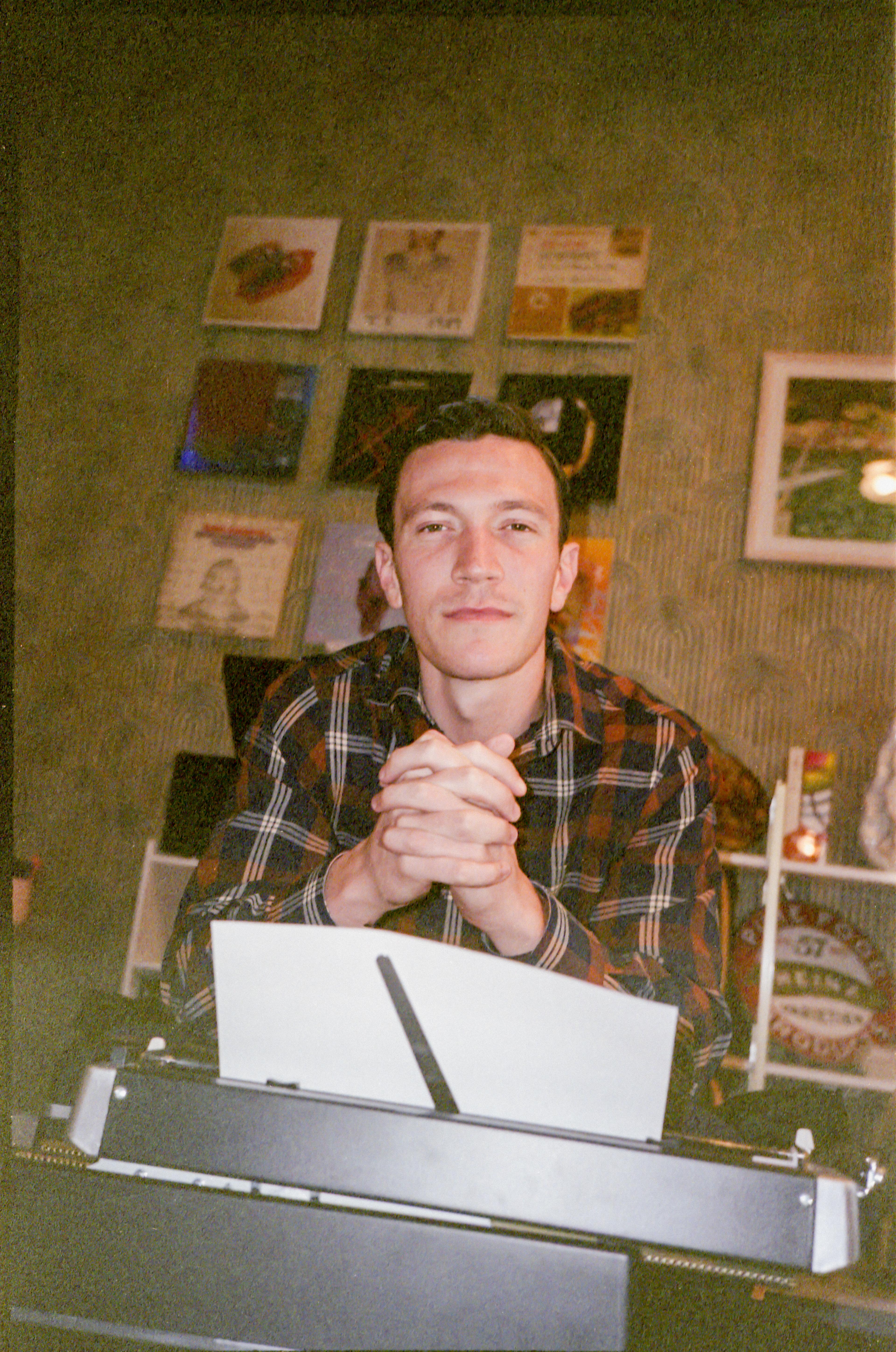David Perell, writing your pivot
With Write of Passage, Perell is teaching Silicon Valley how to write.
Written by Shreeda Segan
Photography by Cathlin McCullough
David Perell’s first words to me are a request for two additional minutes to wrap up a task so he can be “fully present.” I’ve watched Perell from afar for a long time. Still, I’m surprised by the near-religious level of devotion he brings to all of his work.
Perell is the man teaching Silicon Valley how to pivot to writing, running the “Y Combinator for Writers” — a career accelerator that helps tech gurus, business moguls, and other writers sharpen their theses through writing. His customers include online favorites like Packy McCormick, founder of newsletter and fund Not Boring, Jonathan Hillis, web3 builder and DAO founder, Louie Bacaj, engineer-turned-entrepreneur, and Ana Lorena Fabrega, teacher-turned-entrepreneur.
This studio is also where all of his material is set, from his course lectures to episodes of the North Star Podcast, which has been downloaded over 250,000 times as of March 2023 and has featured Silicon Valley cult favorites like Tyler Cowen and Patrick McKenzie.
Buffett is a writer who makes money as an investor. Writing his letter allows him to clarify his thinking and outperform the market for many years.
Ironically, Perell never had a great relationship with education himself. He hated school. He often got Cs and struggled to focus. One of his teachers once said that he’d never met parents “who were more worried about their child’s future” than Perell’s.
“School punishes passion,” says Perell when he returns to the screen, seated in front of a book from architect and designer Christopher Alexander and souvenirs from Disneyland. “But not life. Life rewards passion.”
~
Taking a full Write of Passage course can cost anywhere between $4,000 and $10,000 — the average annual cost of four years of public, in-state tuition. The course teaches students how to move past writer's block, publish publicly, find their people, and 2x their potential.
It also teaches students to build their “personal monopoly,” an area in which they can become the best thinker in the world. “Buffett is a writer who makes money as an investor,” says Perell. “Writing his letter allows him to clarify his thinking and outperform the market for many years.”
Everybody’s monopoly is unique. Perell’s students have written about everything — family, business, agriculture, spirituality. But what they choose to write about requires passion. According to Perell, writing at the level of throughput that Write of Passage requires isn’t possible unless a writer leans into their natural curiosities, the things that they read and talk about in their free time with friends.
That passion doesn’t need to be consistent. For example, Perell’s first passion was airplanes. As a teenager in San Francisco, he read the entirety of the Jeppesen Pilot Manual — a “door stopper” of a book, 700+ pages long. He inhaled issues of the magazine Airports Around the World. He would persuade his mother to drive him to the local aviation museum so he could play an air traffic control systems game that was only available in one of the museum’s exhibits. A young Perell didn’t only want to come in first place. He also wanted to take over the scoreboards and set all the high-score records, from second to tenth place.
But school didn’t spark Perell’s curiosity. He flunked classes, skipped his homework, and refused to touch a book, relying solely on Spark Notes for summaries.
Later on, his high school golf coach Terry Rowles picked up on Perell’s growing passion for the game. For Rowles, golf instruction was at a pivotal moment because of the influence of computing. “Much of what we thought we knew about the golf swing and the physics of the game turned out to be wrong,” he remembers. “Terry had spent years studying these changes. I helped him translate his knowledge onto the page."
“So many people spoke down to me but Terry spoke up to me. Having somebody in my life who said ‘I need you to rise to the level of an adult’ was life-changing.”
Books from Perell's shelf today.
By college, Perell had gotten deep into media theory. He had read both Jeff Bezos’ and Warren Buffet’s annual letters to shareholders. He also discovered how founders like Emily Weiss started companies like Glossier by first building a community of readers.
In 2016, after graduating with a degree in Media Studies from Elon University, a small school in North Carolina, Perell moved to NYC to work as a sales associate for an advertising agency. He was laid off after seven months. Perell was more interested in big-picture questions like the future of media than writing sales decks. His boss told him to “stop thinking like Jeff Bezos and do your job.”
“After they gave me the boot, I did everything in my power to never get a job again,” he remembers. He told his parents he was going to pursue “the worst idea for two years but the best idea for 10.” His parents went on to pay Perell’s rent for a year while he worked obsessively to publish online.
In 2017, Perell started focusing solely on publishing independently. He spun up Monday Musings, a newsletter where he shared five cool things he learned each week. It then evolved into a weekly article on Perell’s favorite topic: the intersection of media, culture, and technology. At first, most of his early readers were his Twitter followers. One day, Tyler Cowen started sharing Perell’s writing on his blog — a magic moment.
In November of 2018, Perell was on a phone call with his friend and fellow writer Tiago Forte. At the time, Forte was building his own course, Building a Second Brain. Perell pitched the idea of working on a course together, incorporating Forte’s ideas on notetaking with Perell’s fervor for publishing ideas online. “The call must have only lasted ten minutes,” remembers Perell. Forte instantly said yes. The two ran the first cohort of Write of Passage together in April 2019.
Just like Perell went from working in sports media to crafting his newsletter, students of Write of Passage often come in with one vision for their futures and walk out with another. Perell speaks of Ana Lorena Fabrega, a student who spent years in school learning to become a teacher. After five intense years spent teaching, “Ms. Fab” quit, disappointed as she watched her students’ passion dissipate as they progressed through school.
In November 2019, Fabrega enrolled in Write of Passage. She hadn’t written an essay since college. The course helped her launch a newsletter and start posting on Twitter. In about a year, she went from just under 700 to over 20K followers on Twitter, where she shares lessons from the classroom and her vision for the future of education.
Then, Chrisman Frank, co-founder and CEO of online education company Synthesis found Fabrega’s newsletter and wrote to her. Synthesis’ vision — to help kids become effective decision-makers and communicators — resonated with Fabrega, who soon joined their founding team as Chief Evangelist. As of March 2023, Fabrega has over 160K followers on Twitter and continues to work with the company.
Write of Passage aims to 2x potential, but Fabrega and some others say they come out with even more than that. Packy McCormick launched his newsletter Not Boring in the first cohort of Write of Passage and went on to raise two funds through it. It’s also where many others go to find their best friends, future business partners, and early readers. Take, for example, Cabin founder Jonathan Hillis, who met his co-founder Zak Fleischmann at Write of Passage.

Never miss another untold story.
Subscribe for stories, giveaways, event invites, & more.
Community is part of Perell’s plan. Attending college in a small town in North Carolina, Perell often felt starved for intellectual kinship. “I’d leave most parties early because I’d rather read a book,” says Perell. “Writing is social. The model people have of writing is that you’re going to be like Henry David Thoreau. You’re going to retreat from society for two years and return with a giant completed tome. The fact of the matter is that most people can’t do that. Most people have jobs and they’re active on the internet. What if we flip that? Share ideas in public, receive feedback, and listen to that feedback. Start writing from interesting conversations with people. Writing is better done in community.”
Today his company employs 21 people. Over 1,600 students from 68 countries have taken his course so far and as many as 30+ editors look over the hundreds of thousands of words produced by his students. An army of mentors, guides, and ambassadors also helps students improve their writing and gain the confidence to share their ideas in public.
Decidedly, it’s not an easy course. “In a world of ease and comfort, we want to bring back discipline, rigor, and high standards of excellence,” he says. He’s inspired by the one course in college that he liked: a philosophy course taught by his professor, Dr. Ann Cahill. The course had no lectures. Instead, students had to read, write, and reflect before each class. This meant everyone was prepared to deeply engage with the reading in the classroom. Students would debate concepts from the reading in small groups, exchange ideas, and take feedback from other classmates. It’s a north star for how Perell runs Write of Passage.
~
For Perell, entrepreneurship is about much more than turning an idea into a startup, raising funding, or scaling a company. Entrepreneurship can even be writing. “Entrepreneurship is a way of being. If it’s in your DNA, you can’t resist it,” he says. It’s a pithy, sticky statement, much like his other aphorisms, like “write from abundance” or “writing is social.” These statements often go viral on Twitter, where Perell has over 300,000 followers as of March 2023. But it’s not just fluff. This is Perell’s bread-and-butter.
“Y Combinator had the founding engineer,” he says. “There was a business person and an engineer. The engineer had the ideas and the business person helped them bring them to market. We’re now moving to the age of the founding influencer. They have the ideas and they bring it to market, but with the help of business operations.”
Write of Passage, then, is a school for discovering a domain in which you can serve as a founding influencer. It’s also the domain where Perell himself is king. “When you write online and put your ideas out into the world, you are a lighthouse for like-minded people,” he says. “You’re attracting all these people who think like you, who want to have interesting conversations with you. It’s so hard to find those people in the physical world and so easy to find them on the internet.”
I ask him what his life might have looked like if he was born even just 50 or 100 years ago. “I shudder at that question,” he says. “The extent to which I thought I was going to be a failure for the first 25 years of my life is just impossible to overstate. I got so lucky that my interests and ideas lined up with my ability to share and publish all the time, which lined up with my ability to teach and present well."
I find myself thinking about my career as a writer and how the internet has enabled me. Perell nods. “It’s a literal rite of passage. It’s a hero's journey where you go through an entire experience, you’re broken down, you’re built back up, and you end up kind of back to where you started. But by the end, you’re an entirely different person.”
More Like This
